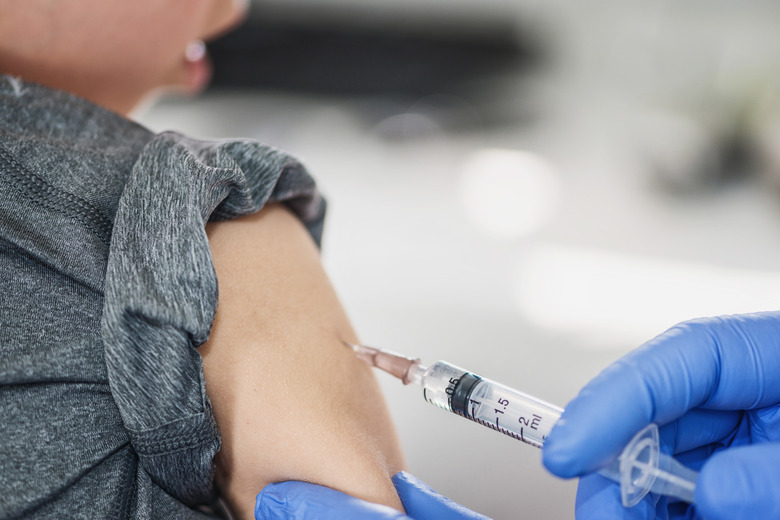How Does The Flu Shot Really Work?
We're months into flu season — and if you haven't experienced the fatigue, nausea and general "ickiness" of influenza this year, count yourself lucky. According to the Center of Disease Control and Prevention's weekly flu tracker, flu activity in the states remains "high" — and it's been growing over the past few weeks.
But, of course, avoiding the flu isn't all about luck, and getting the flu vaccine is one of the most effective ways to avoid getting the flu (as well as protect those around you from the virus). But how does it actually work? Read on to find out.
First, Let's Chat Influenza 101
First, Let's Chat Influenza 101
Before getting into the nitty gritty of the flu vaccine, you need to know what the flu really is. While lots of people call any bout of nausea and vomiting "the flu," the real flu is actually caused by a specific virus: the influenza virus.
Influenza infects your respiratory tract, which means it infects the cells that line your nose and throat. That's why many people with the flu suffer from a sore throat, cough or runny nose, on top of fatigue, muscle pains and a general feeling of achiness.
In more severe cases, influenza can even infect the lungs. When that happens, there can be other complications. For example, "weakened" lungs can get infected with bacteria, causing pneumonia as a complication of the flu. That's how the flu can turn deadly for more vulnerable people, like the elderly or people with compromised immune systems.
Here's How the Flu Vaccine Helps
Here's How the Flu Vaccine Helps
In a nutshell, the flu vaccine — or any vaccine, really — works by "training" your body to attack virus.
Your immune system "trains" by creating special proteins called antibodies, which bind to the virus and target it for destruction. By getting the vaccine in advance, your body already has the groundwork in place to destroy the real flu virus when it shows up.
When you show up at the doctor's to get your flu shot, you may have two options for which type of vaccine to get. Most likely, you'd get an **inactivated influenza vaccine,** made up of viral particles that are already dead. They can't cause an infection (the virus is dead, after all!) but they'll still help your body produce antibodies. But some people might get live influenza vaccine, made up of a live, but significantly weakened, flu virus.
Both vaccine types stimulate the production of antibodies, so they'll protect you from the influenza virus. What's more, getting the vaccine can help shorten or reduce the severity of symptoms, even if you still end up with the flu.
Wait, You Can Get the Flu Even with the Vaccine?
Wait, You Can Get the Flu Even with the Vaccine?
Unfortunately, yes. Beating the flu with a vaccine sounds simple, at least in theory. But unfortunately, it doesn't always work perfectly.
That's because the scientists that create the vaccine can only target a few strains of influenza virus at a time. In order to make the vaccine the most effective, they make an educated guess about which strains will be the most widespread, and target the vaccine to those.
Unfortunately, they don't always guess right. While getting the flu shot lowers the odds of getting the flu by about 60 percent on average, its effectiveness varies year to year. This year's flu shot, which covers the 2019-2020 flu season, is 40 to 60 percent effective, according to the CDC.
So Is it Worth Getting the Shot?
So Is it Worth Getting the Shot?
It's definitely worth talking to your doctor about! Not only can getting the flu shot reduce your chances of catching the flu, but it could also make any flu you do get much easier to get through. Getting the shot greatly reduces the chances you'll end up in the hospital for influenza, for instance.
What's more, getting the shot can protect those around you. Young children, the elderly, and people with existing health conditions can face a much higher risk of (potentially deadly) complications from the flu. If you're protected by the shot, you're much less likely to carry the virus and spread it to others.
Ultimately, though, whether you get the flu shot should be decided by you and your doctor. So ask about it at your next check up. And in the meantime, we hope you're getting through this year's flu season unscathed!
Cite This Article
MLA
Tremblay, Sylvie. "How Does The Flu Shot Really Work?" sciencing.com, https://www.sciencing.com/how-does-flu-shot-work-13724287/. 1 February 2020.
APA
Tremblay, Sylvie. (2020, February 1). How Does The Flu Shot Really Work?. sciencing.com. Retrieved from https://www.sciencing.com/how-does-flu-shot-work-13724287/
Chicago
Tremblay, Sylvie. How Does The Flu Shot Really Work? last modified March 24, 2022. https://www.sciencing.com/how-does-flu-shot-work-13724287/
